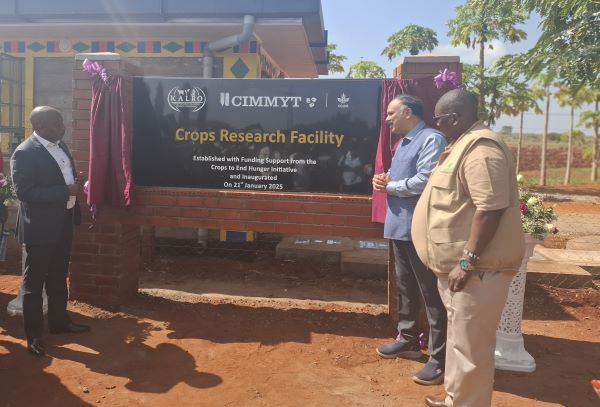The International Maize and Wheat Improvement Center (CIMMYT) has partnered Kenya Agriculture and Livestock Research Organization (KALRO) to establish a research centre of excellence in the country to promote crop production.
The inaugural KALRO-CIMMYT Crops Research Facility located at the Kiboko Research Station is expected to serve as a Centre of Excellence for Crop Improvement and Capacity Building in Sub-Saharan Africa.
The state of the art research station set to undergo a major facelift and upgrading since it was established some three decades ago is set to improve efficiency in crop breeding programs operations
The premises will now be able to reduce intensive manual labour through mechanization of breeding operations, better storage of valuable crop germplasm, and improved amenities to researchers and other staff working at the station, including women and men.
The facility has been supported by the Crops to End Hunger (CtEH) Initiative which is a confluence of multiple international donors including Bill and Melinda Gates Foundation , the GIZ, the German agency to a tune of US dollar 2.1 million and will serve breeding programs of multiple crops.
Speaking during the launch of the facility, Dr. Thuo Mathenge who is KALRO Board chairman said the Kiboko Research Station has long been a beacon of hope for farmers in Kenya and the Eastern African region and has over the time made milestones in crop research and related innovations.
“This facility has been at the forefront of maize breeding, contributing to the development of climate-resilient maize varieties with enhanced tolerance to drought stress, improved nitrogen use efficiency, and resistance to diseases and pests especially Fall Army Worm, a devastating insect pest. These innovations are crucial for addressing the challenges of climate change in our region”, he said.

Dr. Mathenge noted a landmark achievement at Kiboko which was the establishment of the Maize Doubled Haploid Facility in 2013 that has revolutionized maize breeding for KALRO, CIMMYT, national partners and seed companies across Sub-Saharan Africa.
In addition, he added that the station’s advanced screening capabilities for Fall Armyworm have led to the release of three tolerant maize hybrids, now benefiting farmers in Kenya, Malawi, Zambia, Zimbabwe, South Sudan, and Ghana.
The chairman explained that the enhancements made at the facility will significantly boost capacity to address the pressing challenges faced by smallholder farmers, including climate change, declining soil fertility, pest and disease pressures, and limited access to quality seed.
“The enhancements will further promote sustainable agricultural intensification, improve nutritional security, and contribute to the overall well-being of our communities”, he said adding that the facility is more than just an infrastructure upgrade but represents shared commitment to building a resilient agricultural sector that empowers smallholders, safeguards food security, and drives economic growth”, he said
Dr. Mathenge appreciated the partnership between government through KALRO and CIYMMT noting that the work done to ensure there is food security is important and that the products displayed today will trickle down to ‘wanjiku’ .
“The government is working and we are happy that the youth can even tap into value addition when it comes to production of some crops, “, he said and gave an example of the nyota bean , a new high yielding, market preferred and drought tolerant dry bean that youth can tap into , value add and sell the byproducts at the village centres.

Dr. Prasanna Boddupalli, Director CIMMYT said the facility will enable KALRO and CIMMYT to jointly address major challenges faced by smallholders growing crops like maize and dry land cereals and legumes, including climate change, poor soil fertility, diseases and pests, besides improving nutritional security, access to improved and affordable seed, and sustainable intensification of cropping systems.
He noted of the long standing partnership with KALRO which extends for more than three decades, working on breeding for improved varieties of maize, wheat and more recently dry land crops such as sorghum, pearl millet, finger millet as well as pigeon pea, groundnut, chickpea among others.
“ our partnership has has not only impacted very strongly Kenya’s agriculture through breeding and release of several improved varieties of maize with drought tolerance, disease resistance and insect resistance but there is a lot more that we can do to improve the productivity of the African small holders through this hub in Kenya”, he said
Climate change, he noted, has become a necessity and there is therefore a need to constantly develop and release and deploy the improved varieties with climate resilience and resistance to diseases and insect pests.
“The infrastructure here was almost established in 1980s and had served the purpose but required a major upgrade which has seen it now developed to a Centre of excellence for crop improvement across multiple crops that will serve surely as a training hub not only for future generations of scientists but also will inspire young students, young Kenyans into taking up agricultural research as their profession”, Dr. Prasanna said
KALRO Director General, Eliud Kireger said the facility underscores the importance of investing in science and innovation to build a resilient agricultural sector that can withstand the challenges of our time.
“As we inaugurate this facility, let us reaffirm our commitment to working together for the benefit of farmers and communities across Africa. Let us embrace the opportunities before us and continue to lead the way in agricultural innovation, ensuring a food-secure and prosperous future for all”, Dr. Kireger added.
The transformative project includes a Modern office and conference facilities, Advanced seed processing and storage facilities, Cold storage units for long-term storage of germplasm, Machine maintenance facility, A drip irrigation system for efficient water use and an Upgraded electrical infrastructure, including the installation of transformers.
By Wangari Ndirangu


